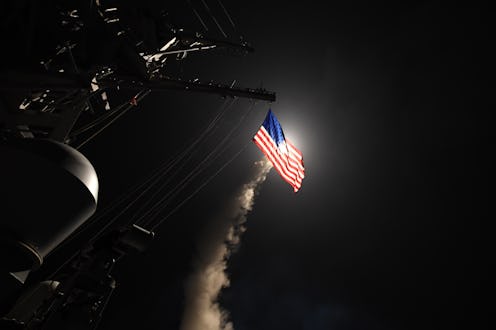
After the United States sent missiles at a Syrian airbase last week, the White House hinted at the possibility of more strikes in the future. In a press conference on Monday, press secretary Sean Spicer said that "barrel bomb" attacks or chemical warfare on Syrian citizens could result in a heightened American military response from the Trump administration. "If you gas a baby, if you put a barrel bomb into innocent people, I think you will see a response from [Donald Trump]," Spicer said noting that America may consider attacks on Syria in the future.
Data shared by a watchdog group called the Syrian Network for Human Rights (SNHR) claimed that Assad's regime allegedly dropped 13,000 barrel bombs on civilians in 2016. The Trump administration has so far launched dozens of Tomahawk missiles on a Syrian airbase in a "one-off" attack in response to a reported chemical attack on Syrian civilians in the northwestern Idlib province. The attack is reported to have killed 70 people including women and children.
The Trump administration believes that the Syrian regime led by Bashar al Assad was responsible for the attacks. In an official announcement for the strike, Trump said, "On Tuesday, Syrian dictator Bashar al-Assad launched a horrible chemical weapons attack on innocent civilians. Using a deadly nerve agent, Assad choked out the lives of helpless men, women and children. It was a slow and brutal death for so many. Even beautiful babies were cruelly murdered in this very barbaric attack."
Trump's military strikes on an airfield held by the Assad regime was met with varying degrees of support and criticism from both liberals and conservatives. Proponents of the attack, like Nicholas Kristof in the New York Times, stated that an aggressive foreign policy emanating from the United States could compel Assad to re-evaluate his tyrannical stronghold over the country and his people.
However, those who criticized the American strikes on Syria claimed different reasons for opposing the sudden shift in American foreign policy toward the country, which has been embroiled in a gruesome civil war since 2011. Opponents feared the possible loss of more civilian lives under an attack, while others implored that American capital not be wasted on yet another war. A Syrian state news agency alleged that nine civilians, including four children, became instant victims of the missiles issued by the White House. The Pentagon claimed that no civilians were hurt in the attack.
Although Secretary of State Rex Tillerson had previously said that defeating ISIS in the Middle East was America's "top priority," it is now clear that there is a shift in America's foreign policy concerning the Syrian civil war. Nikki Haley, United States envoy to the United Nations, stated that America had "multiple priorities" in Syria. "If [Trump] needs to do more, he will do more," she said on CNN's State Of The Union. In addition to that, national security adviser H.R. McMaster told Fox News, "We are prepared to do more."
Spicer's statement to the press along with Haley and McMaster's quotes on CNN and Fox News show that there is an obvious change of tone in America's foreign policy toward Syria generally and Assad specifically. But it is still to be seen whether these statements will culminate in a full-fledged war between the two countries.